Event aims to inspire young learners to grow into individuals with global outlook, Yang Yang reports.
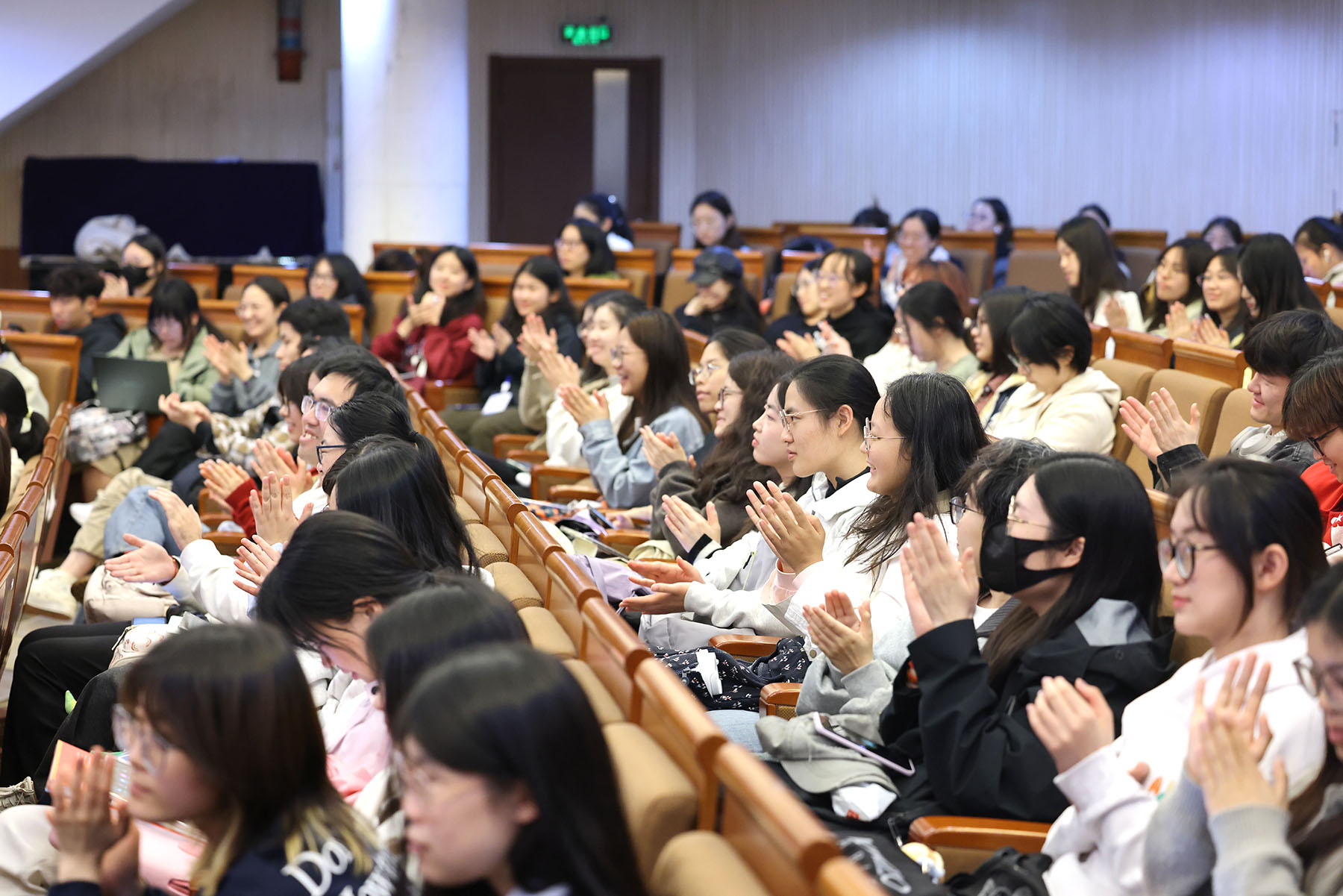
The reading dialogue themed "The Power of Reading" was held at the center of Arabic studies in Beijing Foreign Studies University on Monday to mark the 30th World Book Day that falls on Wednesday.
Co-organized by China Daily, the country's national English newspaper, and BFSU, the event invited eminent guests from different areas to share growth experiences and life wisdom.
Throughout its history, China has prioritized reading, valuing the pursuit of knowledge through investigating the world, and advocating among scholars the Confucian ideal of self-cultivation, harmonious governance and global peace.
Through this reading dialogue, "we hope to inspire young students' passion for learning and encourage them to become talents with a global perspective", says Qu Yingpu, publisher and editor-in-chief of China Daily, in a speech at the event.
In his sharing, Qu recalls his youth when he read avariciously. As an adult, he draws spiritual nutrition from poetry and fiction: poems by Li Bai from the Tang Dynasty (618-907), Chinese classic Dream of the Red Chamber by Cao Xueqin in the Qing Dynasty (1644-1911), the voluminous novels by Russian writer Leo Tolstoy and the magical world created by Gabriel Garcia Marquez.
"Each great book is a world of itself, enabling us to transcend the boundaries of reality and understand the world's diversity," he says.
READ MORE: Young Chinese emerge as main buying force at book fair
Qu encourages the university students to read foreign works in their original languages as a good way to cross cultural barriers, better understand different cultures and learn mutually from each other.
On the other hand, he also emphasizes the importance of social practice, for "knowledge alone is insufficient to address contemporary challenges".
"Young people need to walk out of studies and travel 10,000 miles to learn about the world," he says.
Today, China is facing unprecedented transformations. Science and technology epitomized by artificial intelligence is advancing at a startling speed, international crises in trade, energy, territorial disputes and so on continue incessantly, and the internet and digital products are generating excessive filter bubbles.
"At a time of profound changes unseen in a century, reading plays a crucial role in nurturing globally competent talents and serves as the cornerstone for enhancing international communication capabilities," says Wang Dinghua, Party secretary of BFSU, in a speech at the event.
"If books are the ladder of human progress, then reading is the bridge for mutual enlightenment across civilizations," he adds.
This event marks the beginning of the strategic cooperation between China Daily and Beijing Foreign Studies University, aiming to promote talent cultivation at university with media's practical strengths, says Wang.
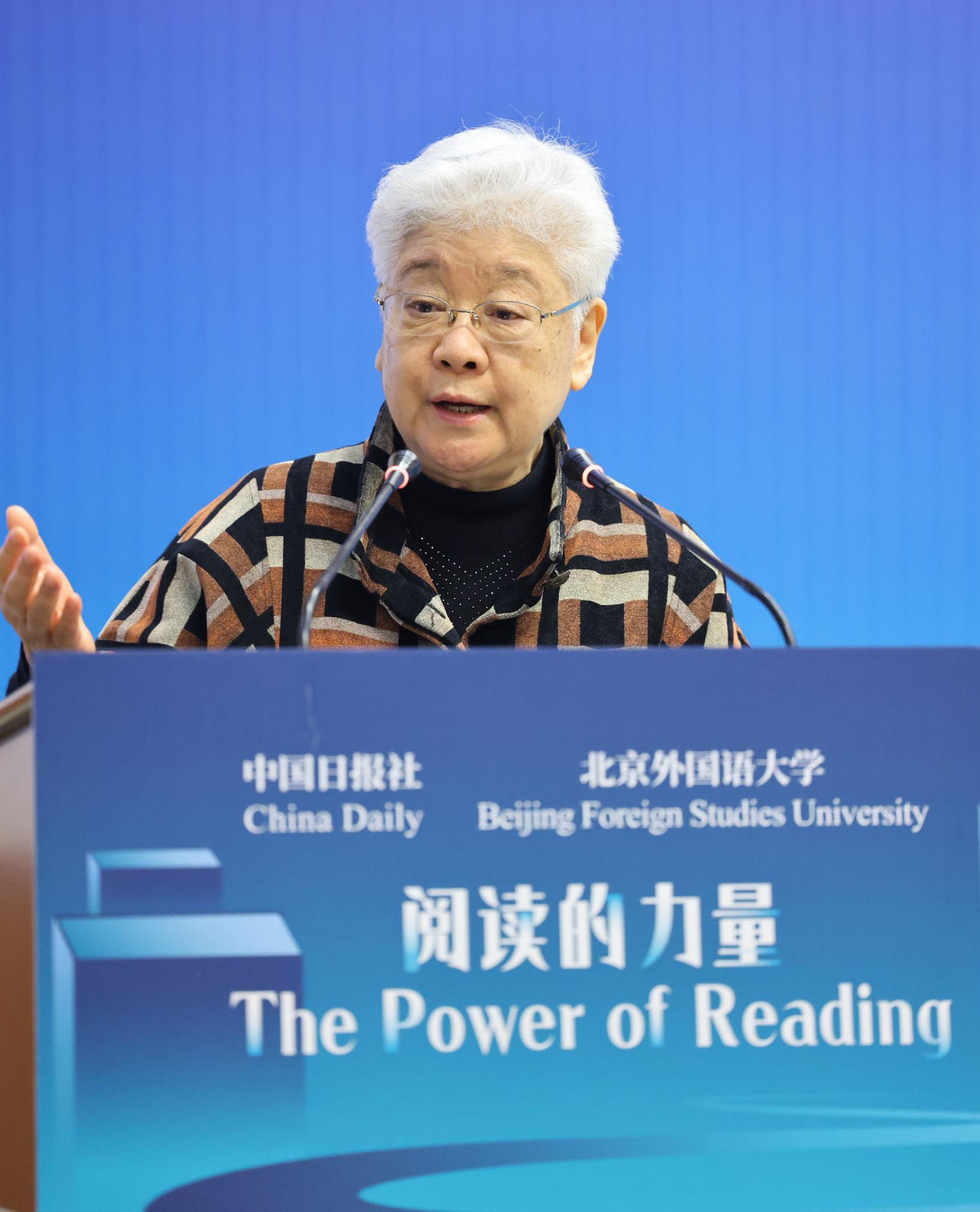
Tang Wensheng: Books are my compass
In 1975, Tang Wensheng faced a diplomatic challenge: interpreting for Guyana's Prime Minister Linden Forbes Sampson Burnham with near-zero prior knowledge of the nation or its leader. Rushing to the archives, she borrowed two English books — one on Guyana's history, another on Burnham's life. Hours of focused reading later, she stepped into the meeting room with newfound clarity. Books turned panic into preparation, she says.
At another diplomatic occasion, when Chairman Mao Zedong cited an ancient proverb — A tree towering above the forest invites the storm — Tang, the interpreter, initially failed to understand until the chairman wrote down several words of the proverb. Tang later realized that "reading isn't just preparation beforehand. You can read to accumulate knowledge afterwards".
As a part-time interpreter then, gaps between assignments threatened her fluency. Her remedy? English detective novels. Armed with knowledge gleaned off the gripping plots and polished prose, she "scraped the rust off her tongue", maintaining the agility her role demanded.
The adviser to All-China Federation of Returned Overseas Chinese, Tang says reading became her compass. Novels lured her first, but memoirs, histories, and scientific texts soon broadened her horizons. During her China Daily years, she confronted her own limitations daily — waves of global news demanding swift comprehension.
Books also taught her humility, she adds. "Only through constant learning and an ever-expanding perspective could I effectively engage with the world," she says.
Today, as AI reshapes industries, Tang's faith in reading endures: "In an age of exploding knowledge, without continuous learning and reading, one will fall out of sync with the world and the times."
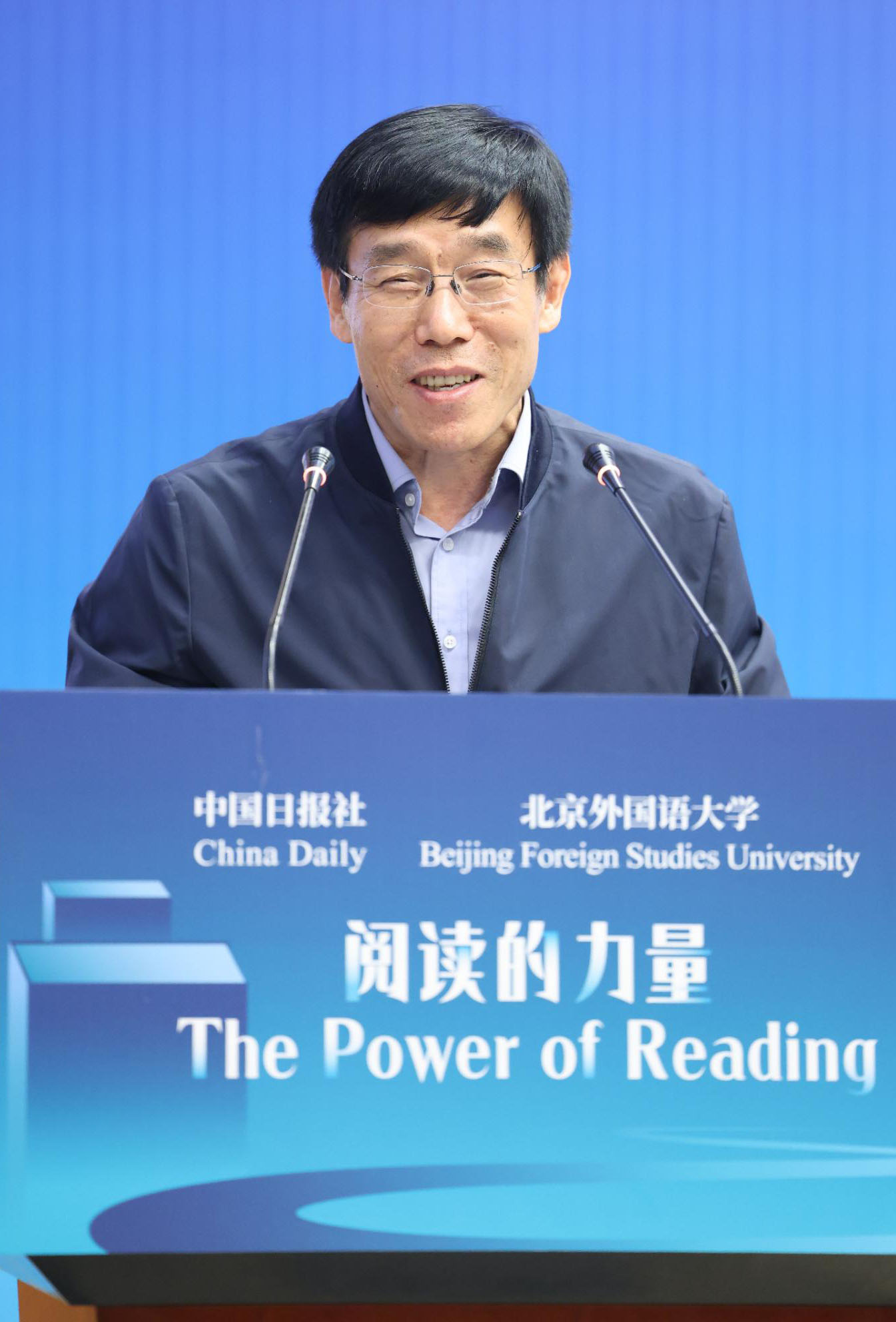
Wang Jiawu: Relentless study is the mantra
For Wang Jiawu, former chief engineer at China's Jiuquan Satellite Launch Center, reading is the key to China's aerospace success.
Growing up in a small Anhui town, the son of factory workers with little formal education, Wang's youth was marked by relentless study — rising before dawn, returning after dark — his only companions being the stars that ignited his fascination for the cosmos. In 1980, he entered Beijing Aeronautics Institute (now Beihang University), driven by an unshakable belief that books could free him from the grip of poverty.
For 40 years, Wang dedicated himself to China's Jiuquan Satellite Launch Center in the desert. Aerospace, he learned, was no single discipline but a symphony of specialties — automation, mechanics, communications — each demanding relentless study.
As a leader in launch operations, he spent three years systematically devouring 56 technical volumes on aerospace engineering. Professional reading wasn't optional; it was survival, he reflects, adding, "those who can persevere in the aerospace industry all share one common trait: love for reading".
At Jiuquan, every launch required meticulously crafted backup strategies, studied and rehearsed, even if never used. Wang recalls the escape tower atop the CZ-2F rocket, a solid-fueled safeguard never activated yet vital to mission confidence.
His commitment extended beyond engineering. Wang sees English mastery as another way to improve personal ability. "Aerospace is more about building resilience through learning."
Today, Wang attributes China's aerospace triumphs to this culture of perpetual study. Reading, he says, is the "North Star" of innovation, a powerful weapon to conquer challenges and explore the boundless cosmos.
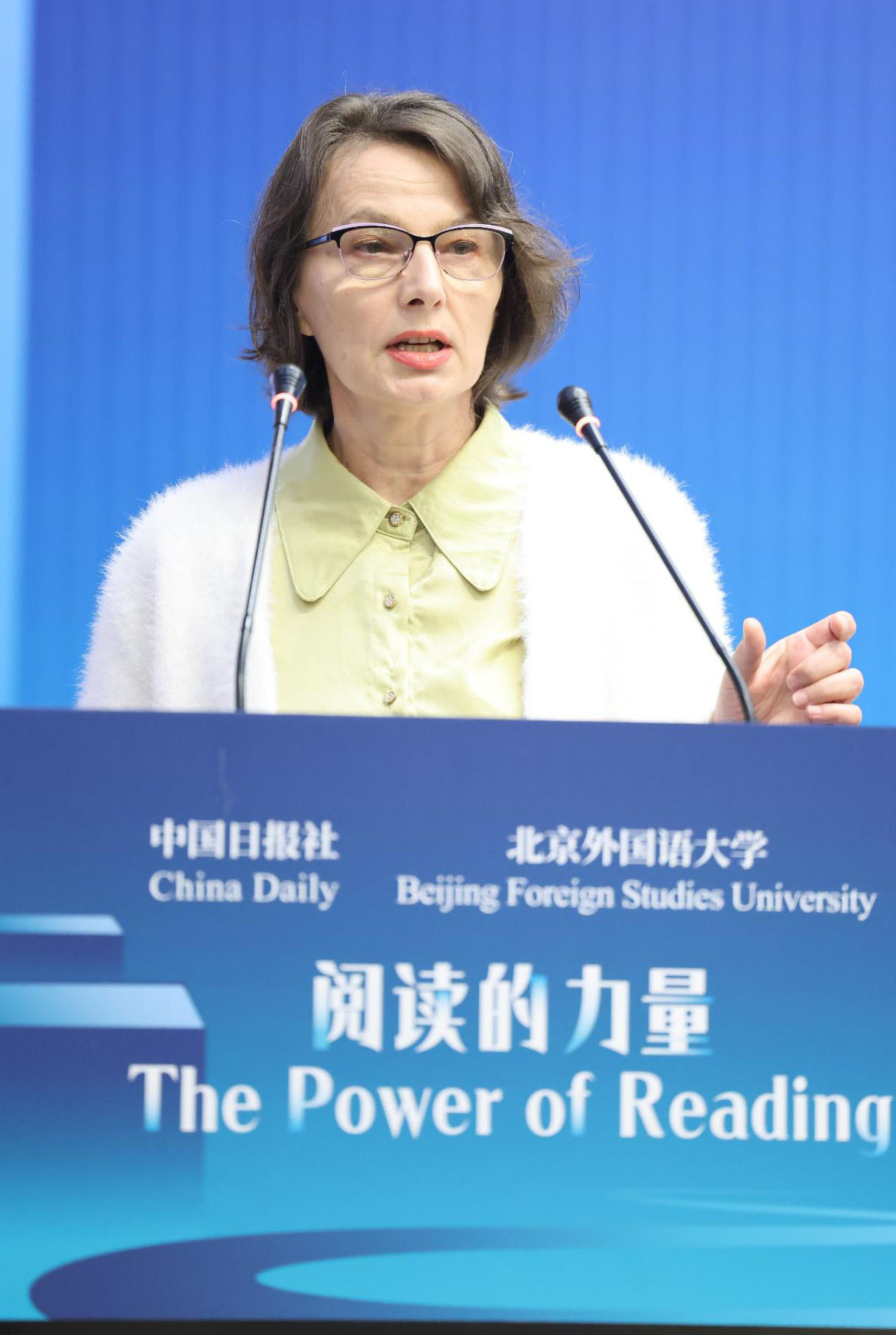
Soldat Tatjana: The magic of paper pages
As a child in Serbia, Soldat Tatjana, now director of the Serbian Cultural Center in Beijing, watched her father read each evening, his fingers tracing lines of text like a sacred ritual. "What magic lay in those pages?" she wondered.
Soon, her parents gifted her illustrated fairy tales. Among them, The Hedgehog's Home — a simple story about a hedgehog defending its burrow — stood out, teaching her patriotism through allegory. "Every book leaves a mark," she says, quoting a sentence Serbian people often say, "even a bad one teaches discernment".
This lesson echoed through her life. At university, Tatjana chose to study Chinese, drawn by Serbia's unexpected cultural similarities with China. Without a Serbian-Chinese dictionary, she decoded characters through a third language, marveling at how words and texts help a society interpret and respond to the world around it through the nuances of its vocabulary.
Books also anchored her during struggles.
Tatjana recalls Nikola Tesla, Serbia's visionary inventor, whose childhood love for history and literature fueled his genius. Like him, she sees books as portals — to science, philosophy, and the quiet resilience of characters like the hedgehog.
Now, amid the frenzy of the digital age, Tatjana champions paper's enduring power. Turning paper pages, inhaling ink-scented air, she finds focus — a tactile ritual no screen can replicate. Reading paper books is a mental training to enhance cognitive functions and strengthen memory retention, she says.
"Its weight in your hands, its scent — these are acts of mindfulness," she says.
While cultivating empathy, reading also serves as a refuge, alleviating stress while nurturing the soul. "Thus, no matter the circumstances, we must never forget the power of reading," she says.
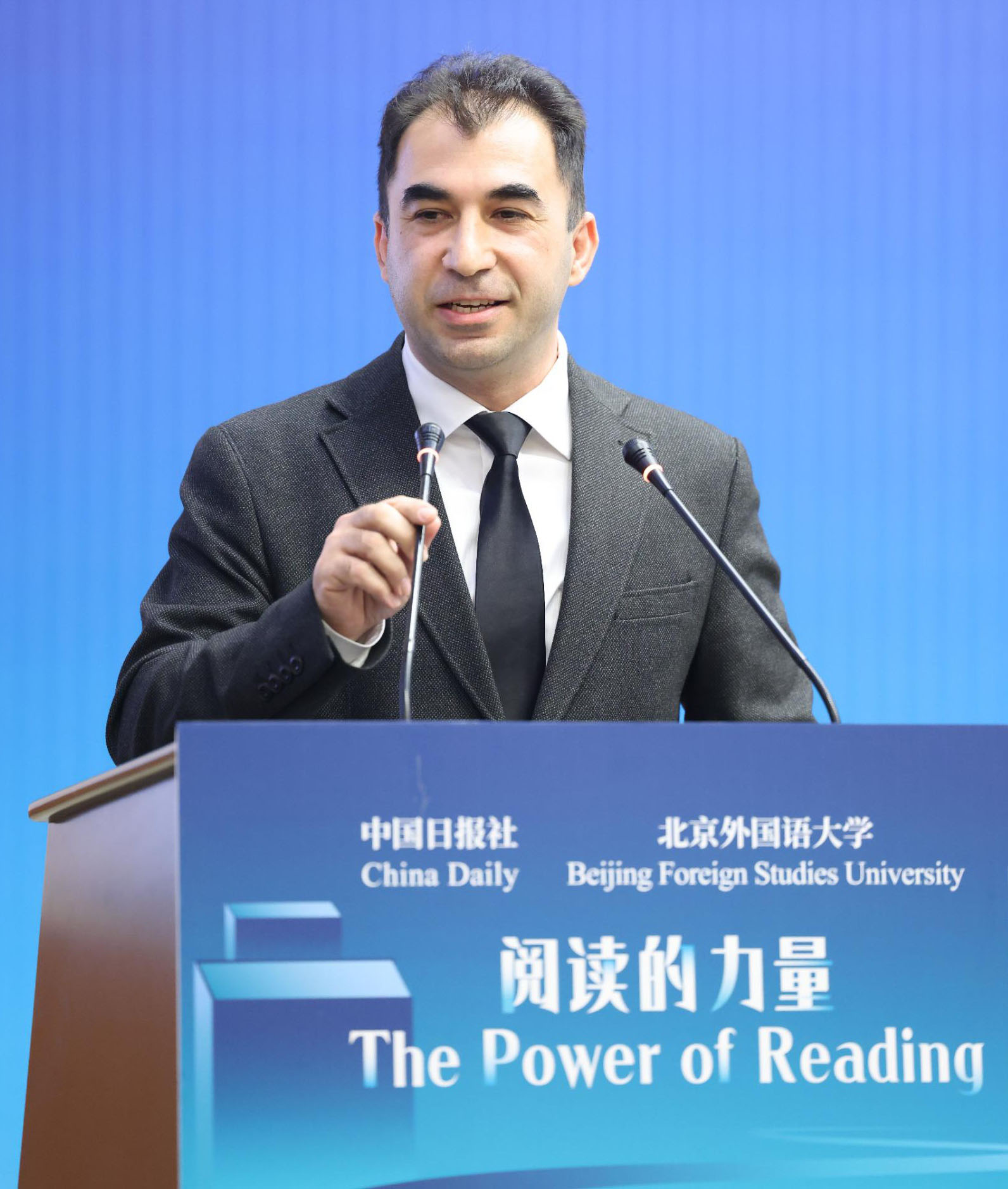
Agshin Aliyev: A journey shaped by stories
Back in 2003, Agshin Aliyev was an undergraduate student from Azerbaijan, studying at Shanghai University. At a campus book fair, he bought a copy of The Analects for just a few yuan.
"At the time, I could not understand the book at all, but I made a promise to myself: one day, I'll be able to understand it, and even translate it into Azerbaijani," Aliyev says in his speech.
Two decades later, he is actually given the task of translating The Analects into Azerbaijani, his translated version being included in Foreign Languages Press's Library of Chinese Classics series.
Now serving as the head of the department of Azerbaijani language at Beijing Foreign Studies University, Aliyev says his entire life has been shaped by the books he read, from the Azerbaijani folk stories he read as a child, to Chinese and English literature classics.
A particularly serendipitous encounter also began with a single book. During his master's studies, he came across a pedagogical book on teaching Chinese grammar to non-Chinese learners.
When he was about to embark on his PhD, he plucked up the courage and reached out to the writer, professor Qi Huyang, which led to Qi taking him on as a student.
He now has a collection of nearly 3,000 books, each one marked with the date and place of his purchase. To him, books are like milestones in his life, recording his growth at every stage.
"The most magical thing about reading is that it's an evolving process. Some books are like seeds. At first, you may only grasp the words on the surface, but as your life experience deepens, they take root and begin to grow within you," he says.
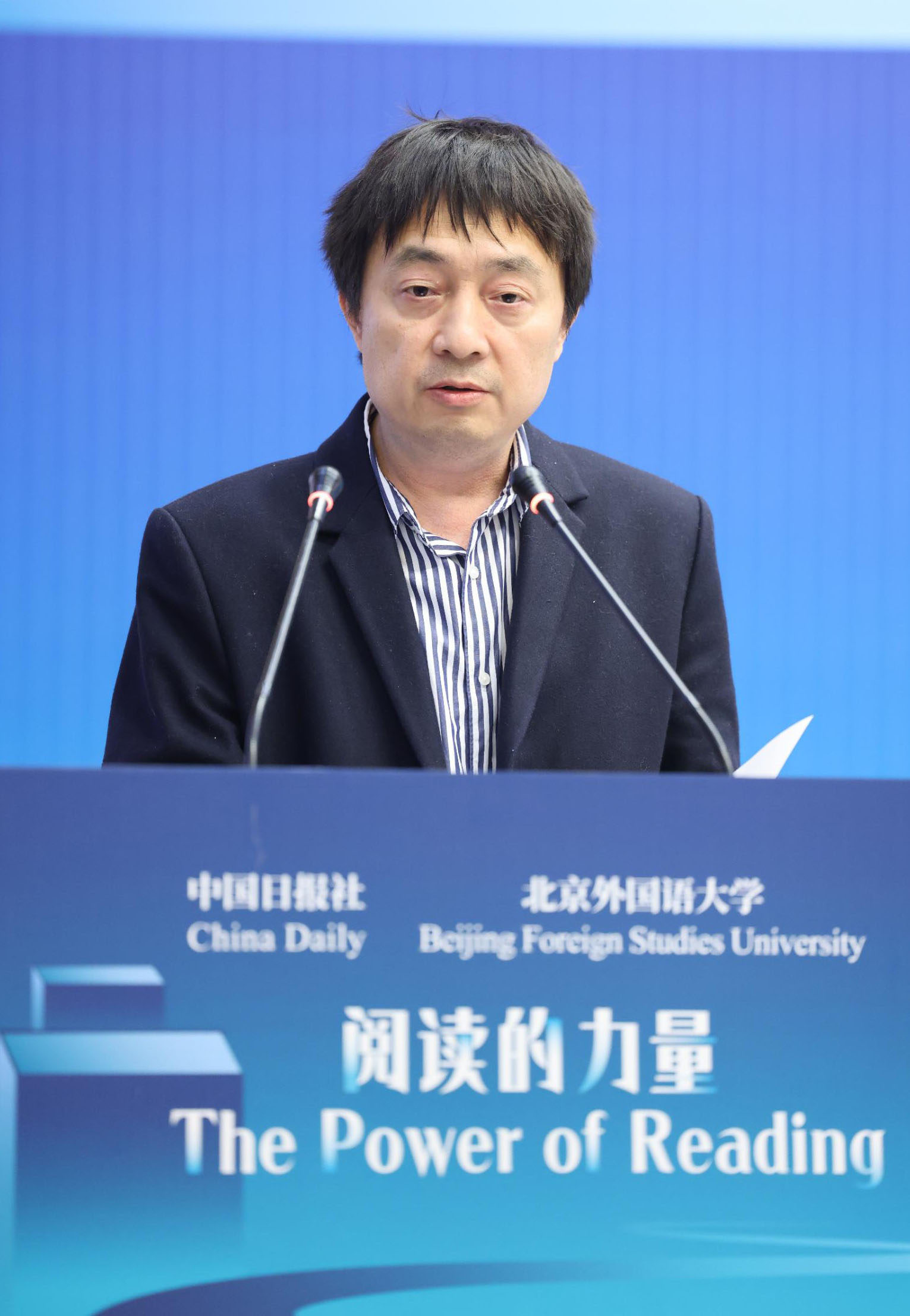
A Yi: Stendhal's novel showed the way
A common saying in Chinese goes, "reading changes fate." For writer A Yi, this is not merely a catchphrase, but his true life experience.
In his speech, he shares how reading changed his life trajectory, leading him out of the mountain valley in his hometown to become a writer and see a broader world.
"From a pragmatic point of view, the most beneficial thing in this world is reading," he says.
Born in 1976 in Ruichang, Jiangxi province, A Yi studied at Jiangxi Public Security College in Nanchang, the provincial capital, today's Jiangxi Police Institute. After graduation, he went back to Ruichang and worked as an administrative officer stationed in a remote police station.
"I saw no need to change anything about that life, until I read Stendhal's novel," he says.
He refers to The Red and the Black written by the French writer. He still has the original copy he bought, on the title page of which he left the date when he first read it: July 27, 1998.
In his description, he "caught the fervor" of the protagonist Julien Sorel, whose ambition and recklessness influenced him to leave his hometown in pursuit of a greater life.
"I realized I should do something worthwhile for this vast land and even the entire planet," he says. "A young person of humble origin is just as entitled to the world as anyone else."
After nearly a decade in media, he became a full-time writer. He has since published 12 books, translated into over a dozen languages.
"Humans first exist, then define themselves through their own will. Life is nothing other than this process of self-design and self-realization," he says.
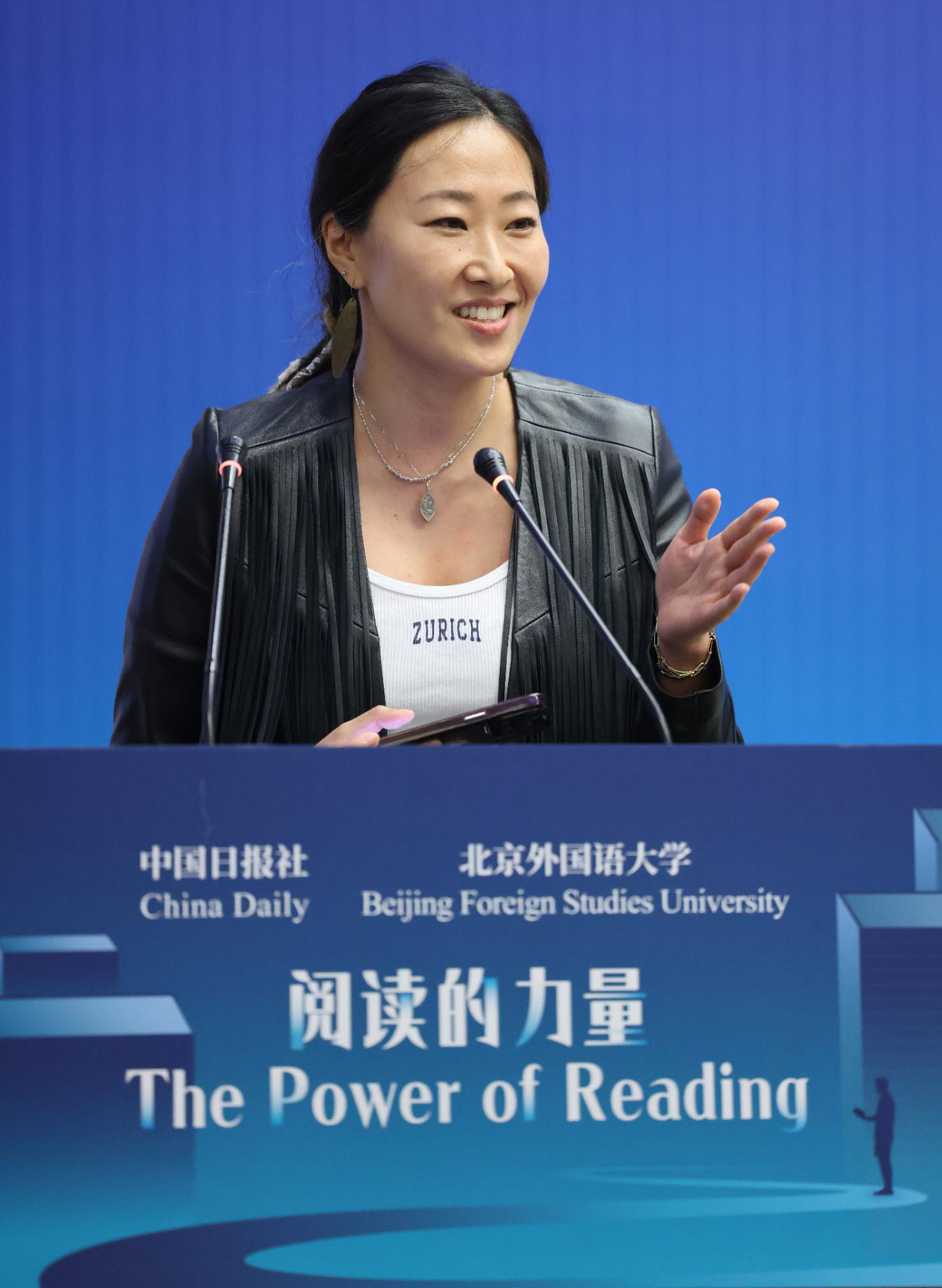
Meng Xiaoshu: Exploring our souls
In this age of rapid development of artificial intelligence, reading is more important than ever before, says writer Meng Xiaoshu in her speech.
With AI tools generating content and recommendation algorithms promoting information to users, Meng addresses questions shared among many — whether it is still necessary to read, and whether it is too late to develop one's own understanding, judgement and worldview.
"Reading is not about acquiring information, because no one can access information faster than through algorithms. Reading is about fostering a deeper connection with the world and expanding the dimensions of our lives," she says.
"When we read novels, philosophy, history, among other books, we are not merely consuming knowledge. We are exploring our souls once and again."
According to Meng, readers are able to reflect on the author's arguments, or the emotional experiences of fictional characters, finding the similarities and differences between them and those of their own.
Rather than being constrained to personal experience, reading allows people to experience others' fate, era and life. In doing so, they preserve individuality and retain objective judgements within a world of complexity.
"AI can simulate knowledge, but it cannot expand the boundaries of one's inner experience," she says.
"Only by reading a vast number of books can we travel back and forth across different times and spaces, carrying with us thoughts, empathy, skepticism and imagination, seeing the world anew and reinterpreting ourselves."
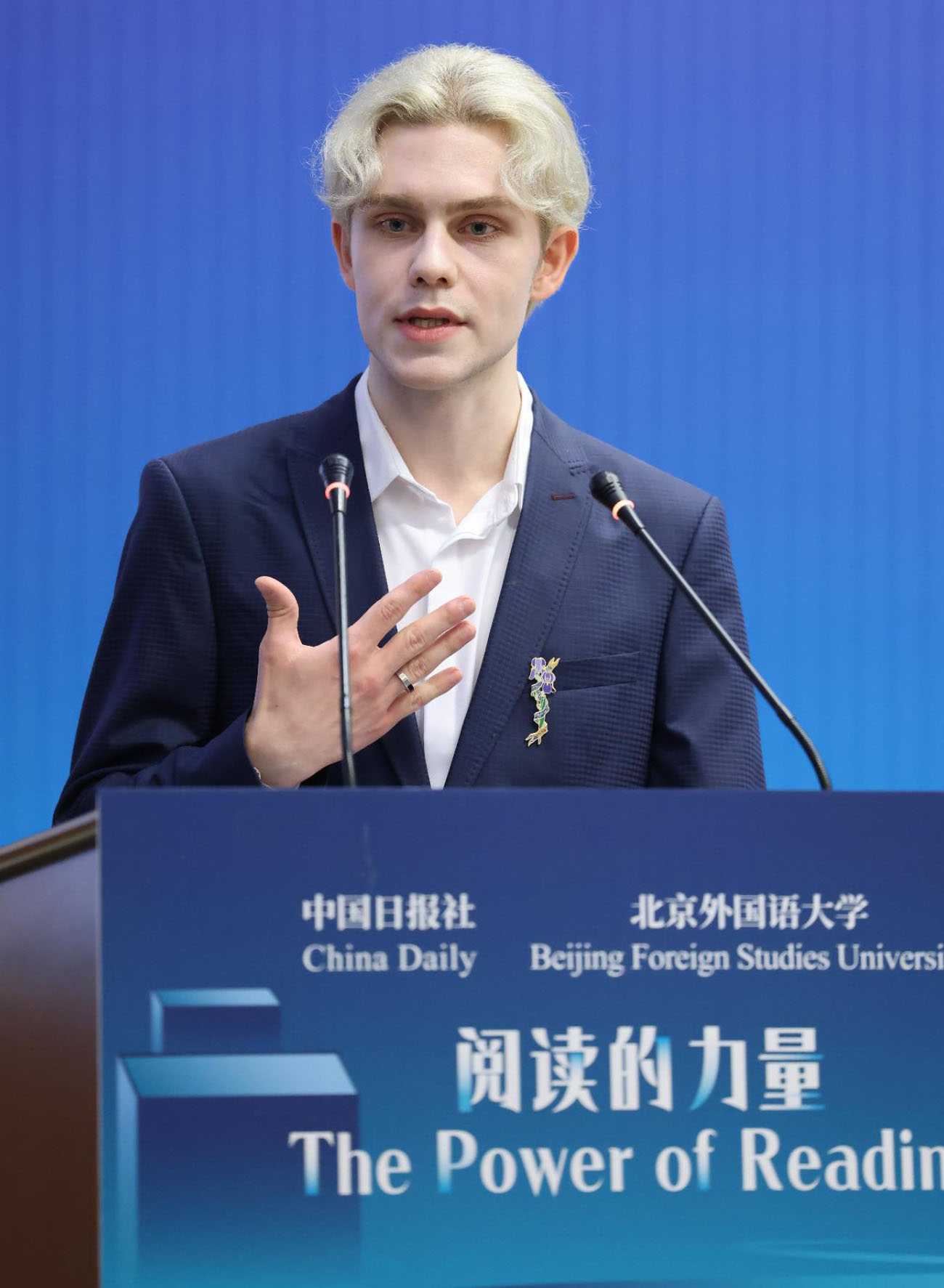
Kirill Kravtsov: Literature helps us connect
For Russian student Kirill Kravtsov, known by his Chinese name Lin Zirui, now pursuing a master's at Peking University's School of Journalism and Communication, reading is a vital means of connecting cultures and encouraging mutual understanding.
In his conversations with fellow students and teachers, he often introduces Russian literature, and listens to their interpretations of Chinese works, finding resonance in books from different cultural backgrounds and of varied genres.
"When we bring Chinese and Russian classics to the same table, different perspectives naturally arise. Through such exchanges, we learn to respect differences and continuously enrich ourselves through dialogue," he says.
In his native Russian, he is drawn to the emotional depth of literary giants like Tolstoy and Dostoevsky. Tolstoy's War and Peace revealed to him the preciousness of human connections in times of turmoil, and in Dostoevsky's Crime and Punishment, he understood the complexity of human existence in the inner struggles of morality and redemption.
ALSO READ: London Book Fair turns a page for Chinese publishers
"It is these reading experiences in my mother tongue that allow me to keep inquiring into human nature, and to find a spiritual resonance with my home culture during my studies abroad," he says.
After coming to China, Chinese literature opened new perspectives for him. He speaks of finding humor and resilience in Lao She's Rickshaw Boy, which says "even the greatest hardship can be slept through," or seeing the vicissitudes of cities and lives in Eileen Chang's works.
"Reading in a foreign language not only strengthens my language skills, but also allows me to reexamine the meaning of fate and life through a Chinese perspective," he adds.
Contact the writer at yangyangs@chinadaily.com.cn


